- Home
- Michael Cunningham
Hours Page 2
Hours Read online
Page 2
Clarissa crosses Eighth Street. She loves, helplessly, the dead television set abandoned on the curb alongside a single white patent-leather pump . She loves the vendor's cart piled with broccoli and peaches and mangoes, each labeled with an index card that offers a price amid abundances of punctuation : "$1.49!!" "3 for ONE Dollar!?!" " 50 Cents EA.!!!!!" Ahead, under the Arch , an old woman in a dark, neatly tailored dress appears to be singing, stationed precisely between the twin statues of George Washington, as warrior and politician, both faces destroyed by weather. It's the city's crush and heave that move you; its intricacy; its endless life. You know the story about Manhattan as a wilderness purchased for strings of beads but you find it impossible not to believe that it has always been a city; that if you dug beneath it you would find the ruins of another, older city, and then another and another. Under the cement and grass of the park (she has crossed into the park now, where the old woman throws back her head and sings) lay the bones of those buried in the potter's field that was simply paved over, a hundred years ago, to make Washington Square. Clarissa walks over the bodies of the dead as men whisper offers of drugs (not to her) and three black girls whiz past on roller skates and the old woman sings, tunelessly, iiiiiii. Clarissa is skittish and jubilant about her luck, her good shoes (on sale at Barney's, but still); here after all is the sturdy squalor of the park, visible even under its coat of grass and flowers; here are the drug dealers (would they kill you if it came to that?) and the lunatics, the stunned and baffled, the people whose luck, if they ever had any, has run out. Still, she loves the world for being rude and indestructible, and she knows other people must love it too, poor as well as rich, though no one speaks specifically of the reasons. Why else do we struggle to go on living, no matter how compromised, no matter how harmed? Even if we're further gone than Richard; even if we're fleshless, blazing with lesions, shitting in the sheets; still, we want desperately to live. It has to do with all this, she thinks. Wheels buzzing on concrete, the roil and shock of it; sheets of bright spray blowing from the fountain as young shirtless men toss a Frisbee and vendors (from Peru , from Guatemala) send pungent, meaty smoke up from their quilted silver carts; old men and women straining after the sun from their benches, speaking softly to each other, shaking their heads; the bleat of car horns and the strum of guitars (that ragged group over there, three boys and a girl, could they possibly be playing "Eight Miles High"?); leaves shimmering on the trees; a spotted dog chasing pigeons and a passing radio playing "Always love you " as the woman in the dark dress stands under the arch singing inn.
She crosses the plaza, receives a quick spatter from the fountain, and here comes Walter Hardy, muscular in shorts and a white tank top, performing his jaunty, athletic stride for Washington Square Park. "Hey, Clare," Walter calls jockishly, and they pass through an awkward moment about how to kiss. Walter aims his lips for Clarissa's and she instinctively turns her own mouth away, offering her cheek instead. Then she catches herself and turns back a half second too late, so that Walter's lips touch only the corner of her mouth. I'm so prim, Clarissa thinks; so grandmotherly. I swoon over the beauties of the world but am reluctant, simply as a matter of reflex, to kiss a friend on the mouth . Richard told her, thirty years ago, that under her pirate-girl veneer lay all the makings of a good suburban wife, and she is now revealed to herself as a meager spirit, too conventional, the cause of much suffering. No wonder her daughter resents her.
" Nice to see you," Walter says. Clarissa knows—sh e can practically see-—that Walter is, at this moment , working mentally through a series of intricate calibrations regarding her personal significance. Yes, she's the woman in the book , the subject of a much-anticipated novel by an almost legendary writer, but the book failed, didn't it? It was curtly reviewed; it slipped silently beneath the waves. She is, Walter decides, like a deposed aristocrat, interesting without being particularly important. She sees him arrive at his decision. She smiles.
" What are you doing in New York on a Saturday?" she asks.
"Evan and I are staying in town this weekend," he says. " He's feeling so much better on this new cocktail, he says he wants to go dancing tonight."
"Isn't that a little much?"
"I'll keep an eye on him. I won't let him overdo it. He just wants to be out in the world again."
" Do you think he'd feel up to coming to our place this evening? We're having a little party for Richard, in honor of the Carrouthers Prize."
"Oh. Great."
" You do know about it, don't you?"
"Sure."
"It's not some annual thing. They have no quota to fill, like the Nobel and all those others. They simply award it when they become aware of someone whose career seems undeniably significant."
"That's great."
"Yes," she says. She adds, after a moment, " The last recipient was Ashbery. The last before him were Merrill, Rich , and Merwin . "
A shadow passes over Walter's broad , innocent face. Clarissa wonders: Is he puzzling over the names? Or could he, could he possibly, be envious? Does he imagine that he himself might be a contender for an honor like that?
" I'm sorry I didn't tell you about the party sooner, " she says. "It just never occurred to me you'd be around. You and Evan are never in town on the weekends."
Walter says of course he'll come , and he'll bring Evan if Evan feels up to it, though Evan, of course, may choose to husband his energies for dancing. Richard will be furious to hear that Walter has been invited, and Sally will certainly side with him . Clarissa understands. Little in the world is less mysterious than the disdain people often feel for Walter Hardy , who's elected to turn forty-six in baseball caps and Nikes; who makes an obscene amount of money writing romance novels about love and loss among perfectly muscled young men; who can stay out all night dancing to house music, blissful and inexhaustible as a German shepherd retrieving a stick. You see men like Walter all over Chelsea and the Village, men who insist, at thirty or forty or older, that they have always been chipper and confident, powerful of body ; that they've never been strange children, never taunted or despised. Richard argues that eternally youthful gay men do more harm to the cause than do men who seduce little boys, and yes, it's true that Walter brings no shadow of adult irony or cynicism, nothing remotely profound , to his interest in fame and fashions, the latest restaurant. Yet it is just this greedy innocence Clarissa appreciates. Don't we love children, in part, because they live outside the realm of cynicism and irony? Is it so terrible for a man to want more youth, more pleasure? Besides, Walter is not corrupt ; not exactly corrupt. He writes the best books he can -books full of romance and sacrifice, courage in the face of adversity—and surely they must offer real comfort to any number of people. His name appears constantly on invitations to fund-raisers and on letters of protest; he writes embarrassingly lavish blurbs for younger writers. He takes good, faithful care of Evan. These days, Clarissa believes, you measure people first by their kindness and their capacity for devotion. You get tired, sometimes, of wit and intellect; everybody's little display of genius. She refuses to stop enjoying Walter Hardy's shameless shallowness, even if it drives Sally to distraction and has actually inspired Richard to wonder out loud if she, Clarissa, isn't more than a little vain and foolish herself.
" Good , " Clarissa says. " You know where we live, right? Five o'clock."
"Five o'clock."
"It needs to be early. The ceremony's at eight, we're having the party before instead of after. Richard can't manage late nights."
"Right . Five o'clock. See you then. " Walter squeezes Clarissa's hand and walks on with a swaggering two-step, a demonstration of hefty vitality. It's a cruel joke , of a sort, inviting Walter to Richard's party, but Walter, after all, is alive, just as Clarissa is, on a morning in June , and he'll feel horribly snubbed if he finds out (and he seems to find everything out) Clarissa spoke to him the day of the party and deliberately failed to mention it. Wind worries the leaves, showing the brighter, grayer
green of their undersides, and Clarissa wishes, suddenly and with surprising urgency, that Richard were here beside her, right now — not Richard a she's become but the Richard of ten years ago; Richard the fearless, ceaseless talker; Richard the gadfly. She wants the argument she and that Richard would have had about Walter. Before Richard's decline, Clarissa always fought with him. Richard actually worried over questions of good and evil, and he never, not in twenty years, fully abandoned the notion that Clarissa's decision to live with Sally represents, if not some workaday manifestation of deep corruption, at least a weakness on her part that indicts (though Richard would never admit this) women in general, since he seems to have decided early on that Clarissa stands not only for herself but for the gifts and frailties of her entire sex. Richard has always been Clarissa's most rigorous, infuriating companion, her best friend, and if Richard were still himself, untouched by illness, they could be together right now, arguing about Walter Hardy and the quest for eternal youth, about how gay men have taken to imitating the boys who tortured them in high school. The old Richard would be capable of talking for half an hour or more about the various possible interpretations of the inept copy of Botticelli's Venus being drawn by a young black man with chalk on the concrete, and if that Richard had noticed the windblown plastic bag that billowed against the white sky, rippling like a jellyfish, he'd have carried on about chemicals and endless profits, the hand that takes. He'd have wanted to talk about how the bag (say it had contained potato chips and overripe bananas; say it had been thoughtlessly discarded by a harassed, indigent mother as she left a store amid her gaggle of quarreling children) will blow into the Hudson and float all the way to the ocean, where eventually a sea turtle, a creature that could live a hundred years, will mistake it for a jellyfish, eat the bag, and die. It wouldn't have been impossible for Richard to segue, somehow, from that subject direcdy to Sally; to inquire after her health and happiness with pointed formality. He had a habit of asking about Sally after one of his tirades, as if Sally were some sort of utterly banal safe haven; as if Sally herself (Sally the stoic, the tortured, the subtly wise) were harmless and insipid in the way of a house on a quiet street or a good, solid, reliable car. Richard will neither admit to nor recover from his dislike of her, never; he will never discard his private conviction that Clarissa has, at heart, become a society wife, and never mind the fact that she and Sally do not attempt to disguise their love for anyone's sake, or that Sally is a devoted, intelligent woman, a producer of public television, for heaven's sake—how much more hardworking and socially responsible, how much more dramatically underpaid, does she need to be? Never mind the good, flagrandy unprofitable books Clarissa insists on publishing alongside the pulpier items that pay her way. Never mind her politics, all her work with PWAs.
Clarissa crosses Houston Street and thinks she might pick up a little something for Evan, to acknowledge his tentatively returning health. Not flowers; if flowers are subtly wrong for the deceased they're disastrous for the ill. But what? The shops of SoHo are full of party dresses and jewelry and Biedermeier ; nothing to take to an imperious, clever young man who might or might not , with the help of a battery of drugs, live out his normal span. What does anyone want? Clarissa passes a shop and thinks of buying a dress for Julia, she'd look stunning in that little black one with the Anna Magsam straps, but Julia doesn't wear dresses, she insists on spending her youth, the brief period in which one can wear anything at-all, stomping around in men's undershirts and leather lace-ups the size of cinder blocks. (Why does her daughter tell her so little? What happened to the ring Clarissa gave her for her eighteenth birthday?) Here's that good little bookstore on Spring Street. Maybe Evan would like a book. Displayed in the window is one (only one!) of Clarissa's, the English one (criminal, how she'd had to battle for a printing of ten thousand copies and, worse, how it looks as if they'll be lucky to sell five), alongside the South American family saga she lost to a bigger house, which will clearly fail to earn out because, for mysterious reasons, it is respected but not loved. There is the new biography of Robert Mapplethorpe, the poems of Louise Gliick, but nothing seems right. They are all, at once, too general and too specific. You want to give him the book of his own life, the book that will locate him, parent him, arm him for the changes. You can't show up with celebrity gossip, can you? You can't bring the story of an embittered English novelist or the fates of seven sisters in Chile, however beautifully written, and Evan is about as likely to read poetry as he is to take up painting on china plates.
There is no comfort , it seems, in the world of objects, and Clarissa fears that art, even the greatest of it (even Richard's three volumes of poetry and his single, unreadable novel), belong stubbornly to the world of objects. Standing in front of the bookstore window , she is visited by an old memory , a tree branch tapping against a window as, from somewhere else (downstairs?), faint music, the low moan of a jazz band, started up on a phonograph. It is not her first memory (that seems to involve a snail crawling over the lip of a curb) or even her second (her mother's straw sandals, or maybe the two are reversed), but this memory more than any other feels urgent and deeply, almost supernaturally comforting. Clarissa would have been in a house in Wisconsin, probably; one of the many her parents rented during the summers (rarely the same one twice— each proved to have some defect for her mother to stitch into her ongoing narrative, the Vaughan Family's Trail of Tears Tour of the Wisconsin Dells). Clarissa would have been three or four, in a house to which she would never return, about which she retains no recollection except this, utterly distinct, clearer than some things that happened yesterday: a branch tapping at a window as the sound of horns began; as if the tree, being unsettled by wind, had somehow caused the music. It seems that at that moment she began to inhabit the world; to understand the promises implied by an order larger than human happiness, though it contained human happiness along with every other emotion. The branch and the music matter more to her than do all the books in the store window. She wants for Evan and she wants for herself a book that can carry what that singular memory carries. She stands looking at the books and at her reflection superimposed on the glass (she still looks all right, handsome now instead of pretty—when will the crepe and gauntness, the shriveled lips, of her old woman's face begin to emerge?), and then she walks on, regretting the lovely little black dress she can't buy for her daughter because Julia is in thrall to a queer theorist and insists on T-shirts and combat boots. You respect Mary Krull, she really gives you no choice, living as she does on the verge of poverty, going to jail for her various causes, lecturing passionately at NYU about the sorry masquerade known as gender. You want to like her, you struggle to, but she is finally too despotic in her intellectual and moral intensity, her endless demonstration of cutting-edge, leather-jacketed righteousness. You know she mocks you, privately, for your comforts and your quaint (she must consider them quaint) notions about lesbian identity. You grow weary of being treated as the enemy simply because you are not young anymore; because you dress unexceptionally. You want to scream at Mary Krull that it doesn't make that much difference; you want her to come inside your head for a few days and feel the worries and sorrows, the nameless fear. You believe—you know—that you and Mary Krull suffer from the same mortal sickness, the same queasiness of soul, and with one more turn of the dial you might have been friends, but as it is she's come to claim your daughter and you sit in your comfortable apartment hating her as much as any Republican father would. Clarissa's father, gentle almost to the point of translucence, loved seeing women in little black dresses. Her father grew exhausted; he gave up his cogency the way he often gave up arguments, simply because it was easier to agree. Up ahead, on MacDougal, a company is shooting a movie amid the usual welter of trailers and equipment trucks, the banks of white lights. Here is the ordinary world , a movie being shot, a Puerto Rican boy cranking open the awning of a restaurant with a silver pole. Here is the world, and you live in it, and are grateful. You try to be grate
ful.
She pushes open the florist's door, which always sticks slightly, and walks in, a tall woman , broad-shouldered amid the bunches of roses and hyacinths, the mossy flats of paperwhites, the orchids trembling on their stalks. Barbara, who has worked in the shop for years, says hello. After a pause, she offers her cheek for a kiss.
"Hello," Clarissa says. Her lips touch Barbara's skin and the moment is suddenly, unexpectedly perfect. She stands in the dim, deliciously cool little shop that is like a temple, solemn in its abundance, its bunches of dried flowers hanging from the ceiling and its rack of ribbons trailing against the back wall. There was that branch tapping the windowpane and there was another, though she'd been older, five or six, in her own bedroom, this branch covered with red leaves, and she can remember thinking back reverently, even then, to that earlier branch, the one that had seemed to excite the music downstairs; she remembers loving the autumn branch for reminding her of the earlier branch, tapping against the window of a house to which she would never return, which she could not otherwise remember in any of its particulars. Now she is here , in the flower shop, where poppies drift white and apricot on long, hairy stems. Her mother , who kept a tin of snowy French mints in her purse, pursed her lips and called Clarissa crazy, a crazy girl, in a tone of flirtatious admiration.

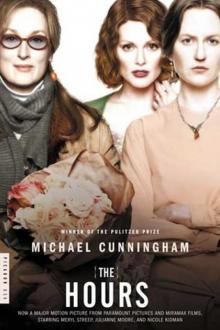 The Hours
The Hours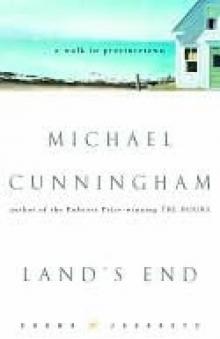 Land's End: A Walk in Provincetown
Land's End: A Walk in Provincetown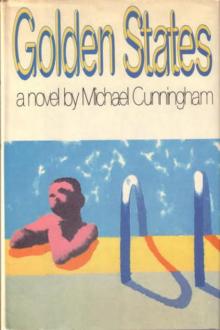 Golden States
Golden States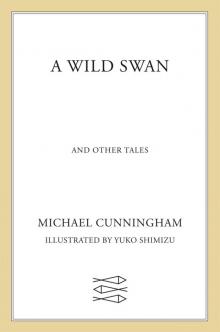 A Wild Swan
A Wild Swan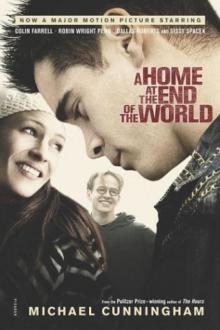 A Home at the End of the World
A Home at the End of the World Flesh and Blood
Flesh and Blood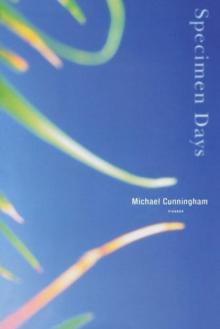 Specimen Days
Specimen Days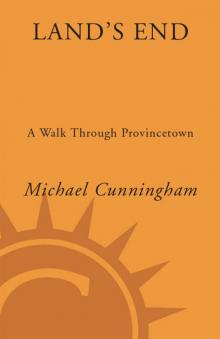 Land's End
Land's End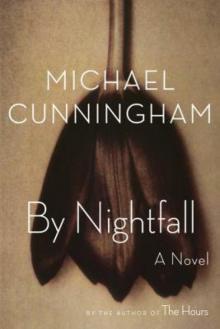 By Nightfall
By Nightfall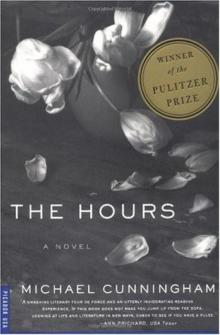 Hours
Hours